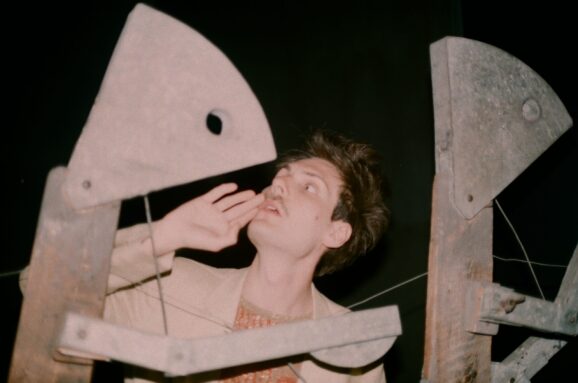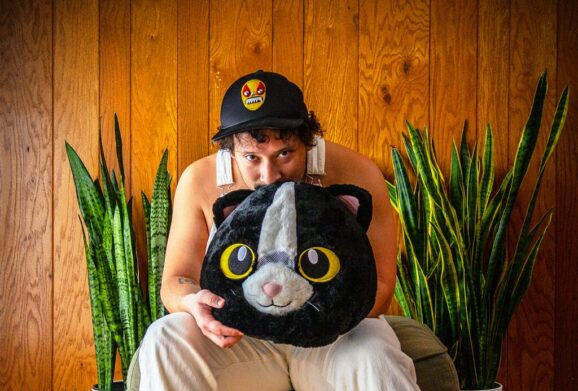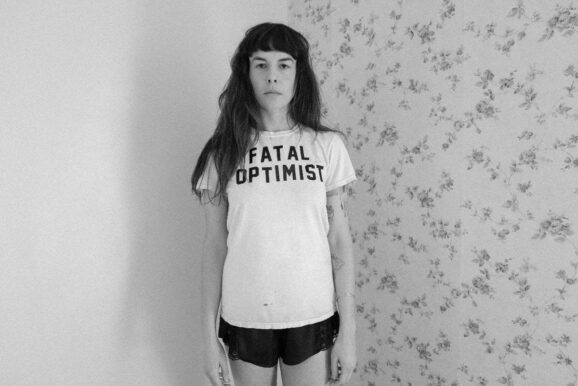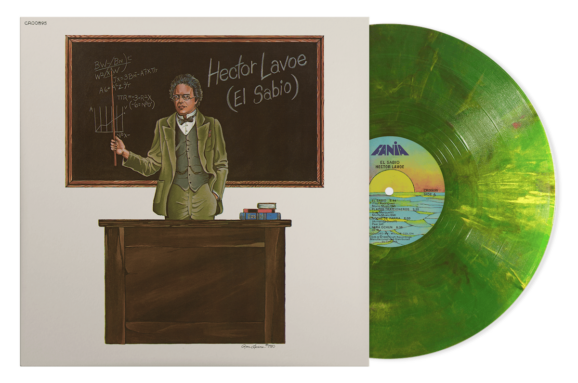“Might put an OG on this beat watch his career get revived… he’s still not touching me though,” exclaims Virginia-bred Hip-hop pioneer McKinley Dixon. The line is said with a joking undertone towards the end of Dixon’s verse on “Crooked Stick,” a highlight from his recently released, critically acclaimed, and artistically daring album Magic, Alive! While Dixon might’ve simply been bragging a bit, the sentiment of this bar becomes more realistic every time Dixon decides to emerge with a new album, and his latest is no exception.
Magic, Alive! is an inspired and refreshing release from one of Hip-hop’s brightest stars, and Dixon’s star is slowly becoming one of the most undeniable the genre has to offer. The daring concept album plays like a fantasy novel, with spell-casters intermingling with the artist’s deep passion and appreciation for jazz. The 11-song effort solidifies Dixon as a fearless, forward-thinking artist whose individuality is as bright as the talents that back it up, and we should all start paying very close attention to the details the artist puts into his work, for there is always something hidden underneath.
With a phenomenal new album out in the world, Glide had the pleasure of catching up with Dixon to discuss Magic, Alive!, his writing process, and what magic really means to him. You can read our whole conversation below.
Magic, Alive! has been out for a few days now. How are you feeling about the reception? Is there a sense of relief when a project you’ve been working on finally gets released, or are you already thinking about the next one?
I still haven’t figured out which one. I have confidence and expectations with myself that each project is going to be different and it’s going to slowly build, but with that, I have to allow myself a little leeway. I don’t know how far anything goes, and right now, I’m in a sort of limbo phase. The album has been out for less than two weeks, and it’s all happening so fast. Right now, I’m figuring it out.
Speaking of being in a limbo space, how long was the period between your finishing of the album and its release? What is that waiting period like?
Yeah, we did. During that time, it’s a lot of figuring out music videos, tours, and what we’re going to do after the album comes out. While it’s not a lot of recording, it’s a lot of keeping your wits about you when it comes to the future.
You recently moved to Chicago. How are you enjoying the city so far? Is this your first time living outside of Virginia?
It’s the first time I left the city that made me, which is Richmond, Virginia. I spent most of my childhood in Maryland, and the transition from there to Richmond was so easy because it’s only a few hours away. Chicago was sort of half of the country away, and it’s a way bigger city; Richmond only has about 230,000 people. It definitely was a leap into what it’s like to be in a place that has a West Side, where I live. It’s a complicated neighborhood, but I love being a part of it, and I think that is something everyone should do. If you can, leave the small town you’re from and try a little bit.
Is that change of environment what inspired your move? Why did Chicago speak to you?
I made so many love letters to Richmond on all the records I made before, and I needed a new place to dedicate my energy to learning about. What I do is I feel the ground. When I feel the ground in Richmond, it feels so familiar, and I know where everything is, to a fault. I feel the ground in New York, and I have family out there, but it feels like there is so much going against what the city actually needs, which makes it complicated. In Los Angeles, another place with a heavy music presence, I don’t feel too much when I walk around there. Chicago, though, when I’m here, the energy here says things can still change every day if you want them to. That is something that I drifted towards when I was looking for places that weren’t too big of a jump.
Richmond is having a moment between you, Mutant Academy, and $ilkmoney. How does it feel to be a part of a regional movement in Hip-hop that is spreading to other areas?
It’s great, I love the lineage of Richmond. There are so many artists who came out of the city. It’s hard because post-COVID, there aren’t many house shows. When I was coming up in the city, Richmond was very punk-heavy, and I love hardcore music, but because of that, there were so many house shows happening. There weren’t many people outside of legends like DJ Harrison and Ohbliv; people like that were few and far between. There weren’t many people in my age group doing things. When a scene became accessible to us, it just created so many incredible artists, as you mentioned. There are so many different directions you can take, being from Richmond, it’s awesome.
Where did your love of jazz come from?
Richmond has a big jazz scene, with Butcher Brown being legends from the city. To me, my music is a communication; it’s me having a conversation. Sometimes, conversations go up and down, sometimes you’re angry, happy, things like that. When I’m writing my music, I had to find the best medium to have that energy and feeling over top of, and it came to me that it was jazz. Jazz can get louder, quieter, it can speed up or slow down, it can be angry or happy, it can distance itself, and it doesn’t feel weird. For my music, I love being able to go up and down, and jazz made sense. It took a lot of time, but this is the end result of me figuring it out, so the music isn’t just rap, but it’s also jazz, and it still feels like a conversation.
Are there any particular jazz records or artists that helped you come to this conclusion?
Kamasi Washington’s The Epic, that’s a big one. That one took me from a place and put me into a place that was like, “Oh, I can make these different songs and still have a connection to Hip-hop in a way.” That was a big one. The Epic is like three hours long. I love that record so, so much. I love everything Kamasi does, but that one specifically is like “Whoa, we’re here for three hours.”
I actually worked at a thrift store, and somebody donated a bunch of records, and The Epic was one of them. It was that one, and a CD of his next album, Heaven and Earth. I took them so quickly, I was blown away that somebody was donating these albums.
The new album is centered around magic, and that seems like a magical moment. Is that the type of magic you refer to on the new album? Was your definition of magic recontextualized while you were making Magic, Alive!
To me, magic is the intersection of knowing the past, present, and future, being familiar with the ground you walk on, and luck. That’s just my definition; magic has so many definitions, and they’re all valid. That’s the way I explain it. I think everyone inherently has magic in them, and everyone can be aware of it. Those three things aren’t hard to do; they’re just harder things to continuously think about. If you just keep your mind open, magic will happen. It also gives the idea of magic a broader definition, so you don’t have to worry about “Oh, it’s everywhere all the time.” No, it’s sort of when there is intention in something.
The story goes that you found a copy of Grant’s Annual of Magic after you had already finished Magic, Alive! Can you tell me about that?
I found a really cool magic book somewhere in Portland. It’s this old, scary book from around 1936, and it just teaches you how to do magic tricks. The magic tricks are kind of eerie, just because it’s the original magic book.
Did coming across that book at that specific point in your life help finish off anything with the album, or make you think about the project differently?
It just came at a really interesting time. I was just strolling through a bookstore and found this old magic book in a hole-in-the-wall place in a city that I’m not used to being in.
As an avid reader, are there any books you’d recommend to fans who appreciate your music?
I would say Hitting A Straight Lick with a Crooked Stick by Zora Neale Hurston. There are some great short stories in there, and “Crooked Stick” off the album is based on that.
Magic, Alive! is your first album that isn’t entirely autobiographical. What was it like writing outside of yourself like that?
It’s nice to be able to just write a story. With a lot of genres, but with rap music, I would love to see just a little more magic in whatever that is. It’s really fun to write a story that can include a song like “F.F.O.L.,” where a hand catches on fire, or “Crooked Stick,” where we resurrect a kid and run around the city. Those moments are so fun to have when you’re writing a story.
Are you typically reading, watching, or listening to other art when you’re writing a story like this? Do you look for inspiration in other art while creating, or do you let that inspiration come more naturally?
Usually I’m watching my loved ones or friends, or something I’m enjoying, or maybe not enjoying. I don’t write linearly, so it’s kind of just moments that I’m really inspired by. They’re often. If I continue to live my life with my intentions and try your best, you find so many moments you can pull from.
I love listening to rap music that is not in my genre’s wheelhouse. I love going to other genres for inspiration, whether it be close or far. I like listening to how people say stuff.
Interestingly, you don’t write linearly, considering Magic, Alive! features “Run, Run, Run Pt. II,” following up a song on your previous record. Were the moments that inspired those songs similar?
I just thought “Run, Run, Run Pt. II” would be a funny way to acknowledge the success of “Run, Run, Run.” I’m lucky to have a song that’s so catchy and so popular, and it’s a good song to me. I did go into “Run, Run, Run Pt. II” thinking, “Let’s make a sequel to the blockbuster hit that is ‘Run, Run, Run.’” Let’s make it a triumphant return. I thought that was a really cool way to acknowledge that the first one is so prominent in so many people’s lives.
Going back in your discography, 2021’s For My Mama and Anyone Who Look Like Her was the moment you really started to grab the public’s attention. What makes that album so special to you, and how do you feel you’ve progressed since that release?
That project is so special, one reason being the timing. I have two records before that, but if you listen to For My Mama and Anyone Who Look Like Her now, you can hear the beginning. It was a new decade, and it was time for me to put together a body of work. Now, that album makes more sense. The popular belief is that I’ve been consistent with the timing and quality of my work, and you can watch that growth so obviously, which is really cool.
The thing that made it really popular back in the day was that you could hear everybody at the beginning of this timeline. It’s really janky, you can hear us still figuring it out, I actually didn’t use click tracks for a lot of that album. The first song on For My Mama and Anyone Who Look Like Her, “Chain Soo Heavy,” sounds like that because I wasn’t using click tracks. You can hear people mess up, and the song just stops because I wasn’t using click tracks. It was a mess, but it was the beginning of Magic, Alive! in a way.
Looking back, it’s clear your 2021 album was the start of this unique sound you’ve crafted, but did you feel that way while making For My Mama and Anyone Who Look Like Her?
Definitely. My music is cool, but I think people think my music is complicated. The best thing about Magic, Alive! is that it’s more accessible. People hear the density of my lyrics and the density of my music and think it’s complicated. In actuality, it’s not complicated; anyone can do it. The best thing that I think I can do is look to the past, present, and future, and sort of draw upon it in a way that is so specific I can write about it. That’s harder for people to do. I think I always knew that, eventually, we would all come together at a point where the music would sound like it sounds now.
You worked with producer Sam Yamaha on Magic, Alive! How did you first connect with Yamaha? Do you remember the first beat you heard that made you decide to work with him?
I usually do everything in Richmond. All the musicians I work with and everyone is in Richmond. We don’t really bring in too many folks outside of that. With this album, Yamaha approached my manager and was like, “I really loved McKinley’s last record, I’m a producer, and I would love to work with him. This is what I made.” It was sort of the first time someone studied my sound and tried to make something that is not for the artist you are now, but for the artist you will be in the future. It was really cool that he was studying my stuff like that.
The first beat Yamaha sent to me, funny enough, was “Could’ve Been Different.” That song is one we changed and rearranged, but that was the first beat he sent me. It was obvious from there. We brought it back home, and we all decided we needed to have this sound.
Speaking of collaboration, you have proven to have a phenomenal ear for features, especially on Magic, Alive! How do these features come about, and how has your approach to collaboration changed over the years?
It really depends on who. The way I write, they’re all different records, but they’re all in the same world. It’s sort of like Wes Anderson, for lack of a better example. Different movies, but the same people come in, so you’re aware of how he does it. There’s a familiarity that is inherent in his movies because of that, and that’s sort of what I’m trying to do. I want you to be able to hear a Teller Bank$ and go “Whoa, let me go into his catalog and see how he connects” or “I know exactly how he’s going to sound on this record.” With Alfred. or Ghais Guevera, those are the type of people I never make records without.
They are also exactly who I need. I don’t need to go to a big feature if I already have some of the characters that I can rely on. I always try to work with the same rappers for every record, but Magic, Alive! is special. Guys like Quelle Chris and Blu are legends and artists I grew up listening to, so that one tied off and came back to the magic of it all, especially with Blu’s verse towards the end and Quelle Chris’s role being this spell-caster. It was another way for me to make a little more magic with those I have featured on there.
You have a big tour in support of Magic, Alive! coming up. What are you looking forward to most about being on the road, and what songs from the new album are you most excited to perform?
I am excited to see new places. I love being able to take time for myself and then getting back on the road, and being like “Okay, yes, this is what it’s like to be here,” and seeing people that I haven’t seen in ages. I think that’s another great part of being on tour, talking to people that I haven’t seen in a while. Honestly, I’m just excited to play the whole record.
We’ll have a full band, guitars, bass, keys, drum tracks, it’ll be fun. The rhythm section I recorded the album with is the same musicians in the touring band.











